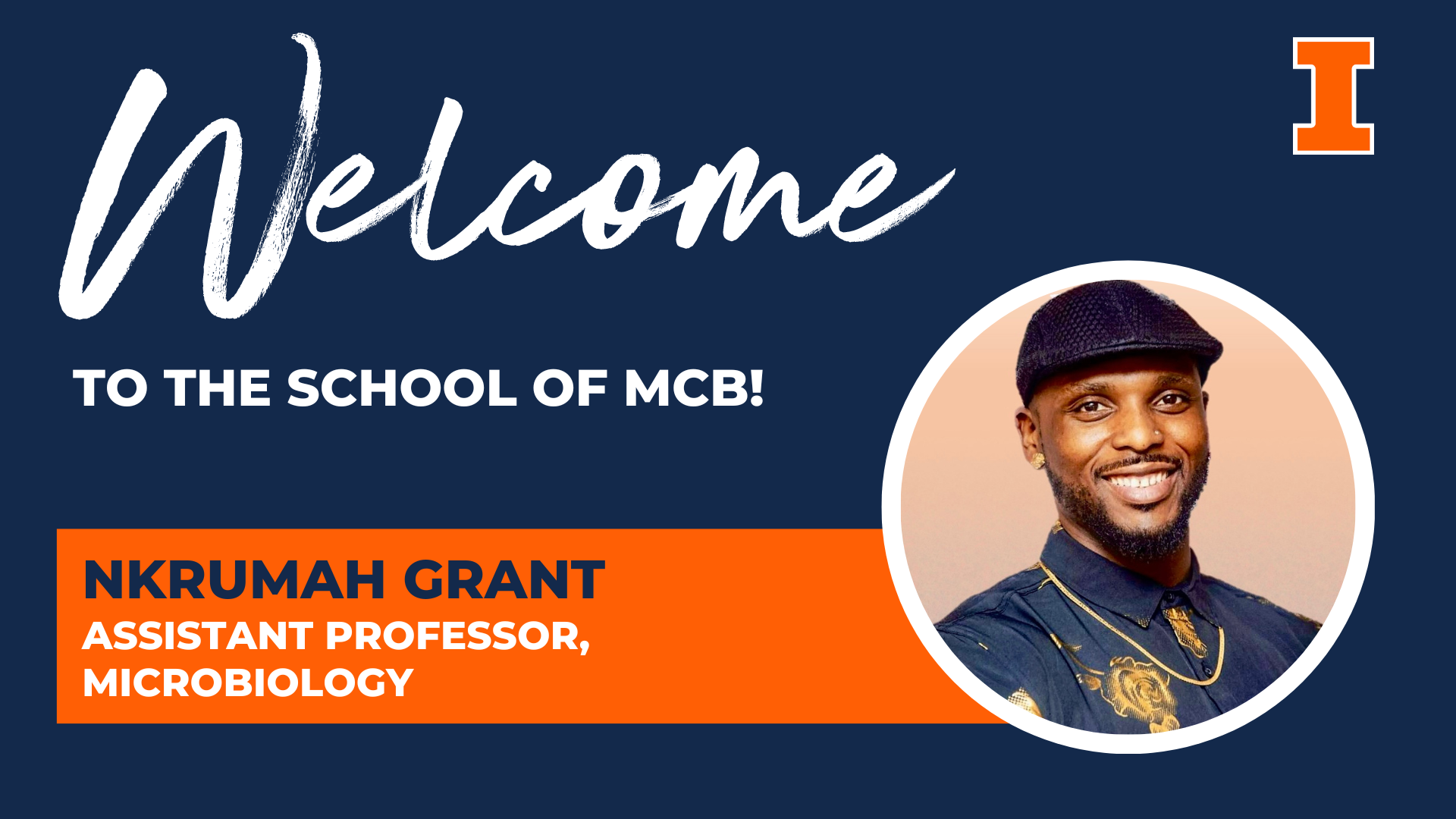
The School of Molecular & Cellular Biology and Department of Microbiology are pleased to welcome Dr. Nkrumah Grant as assistant professor of microbiology. Grant joined us in November 2023 from Michigan State University and the University of Idaho, where he conducted his postdoctoral research.
Tell us about your lab and your research focus, including how you came to choose or specialize in this area.
My lab combines evolutionary theory, microbiology, molecular genetics, and genomics, to understand the ecology and evolution of pathogenic bacteria in the natural environment and their hosts.
Specifically, we aim to understand the environmental contexts under which certain genetic combinations in the pathogen Vibrio cholerae, the causative agent of the deadly disease cholera, reduces its ability to survive and cause infection. I came to specialize in this area because cholera represents a disease of inequity, affecting individuals in areas with limited resources including access to clean water. By establishing the proximal causes of the genetic combinations that reduce the evolutionary fitness of V. cholerae, my lab aims to generate intervention strategies toward reducing the burden caused by V. cholerae within the world’s most vulnerable populations.
What is especially exciting about this particular area of research, at this time?
Understanding the complex behaviors microorganisms exhibit has always been exciting but has been limited by the tools available to assess them. Aided by advances in genomics, bioinformatics, and AI, for example, microbiologists can now perform multi-component and high-throughput data acquisition, enabling simultaneous capture of varied features of bacterial behavior including their evolution. I’m particularly excited about the prospect of generating predictive models using such high dimensional data toward forecasting evolution.
What interested you the most about becoming a faculty member in the School of Molecular & Cellular Biology and the University of Illinois?
I’ve always been fond of the research being conducted at the University of Illinois Urbana-Champaign. In fact, I applied to the university for graduate school. Although my application for admission was denied, I held onto the hope that one day I’d earn the opportunity to collaborate with faculty at the institution.
That day arrived when I was invited to speak at the Department of Microbiology's Abigail Salyers Distinguished Early Career Research Seminar—an invitation that extended beyond the window to experience the welcoming culture within the School of Molecular & Cellular Biology, among faculty, staff, and students alike. I fell in love with the institution at that point, feeling it was a good location for me to call home.
What are your teaching interests?
My unique trajectory to professorship includes dropping out of high school and a short stint in juvenile detention. To overcome these obstacles, I spent a lot of time reflecting on how I wanted to be remembered when I closed my eyes for the last time. Realizing that I was the orchestrator of my future, those experiences taught me that failure doesn’t define a person but can often help build character. It also taught me that growth happens most when an individual positions themself in spaces that are sometimes outside of their comfort zone, owning who they are in the process.
Having worked my way through college and the professoriate with such a dynamic background, I understand the importance of meeting people where they are, and not where I think they should be. As an instructor and principal investigator, I look forward to fostering a learning environment that values, individuality, curiosity, and tailored mentorship. My interests include pedagogy that approaches microbiology from an evolutionary framework including, microbial experimental evolution, evolutionary medicine, and evolutionary biotechnology.
If any students (undergrad or grad) are interested in working in your lab, what’s your advice or how can they get in touch with you?
When I started undergrad, I had no idea what I needed to do to become a scientist. Fortunately, my biology instructor took interest in me, asking if I had ever considered doing research. Conducting research changed the way I learned, making me a better student. Accordingly, I whole-heartedly value undergraduate research and have provided opportunity for students to complete independent research projects under my guidance throughout my graduate and post-graduate career. This will continue here at UIUC, where I will open my doors to rising sophomores and juniors for undergraduate research experiences. Prospective students interested in working in my lab should send me an email to schedule a meeting. In that email, the student should offer a brief introduction of themselves including their career goals and aspirations. I am enthusiastically looking forward to hearing from you!
Tell us about someone who made a difference in your life, such as someone who sparked your interest in biology, who encouraged you to pursue a career in academia or challenged your thinking about a topic.
Although my life story is dynamic, I have always been fond of science and the natural world. The transformative period came for me when I enrolled into an alternative education high school. My science teacher, Mr. Painter, played a docufiction TV show that used the rules of life on earth to ask the question: what life might evolve to look like on a planet with adjustments to earthly parameters, say differences in the atmosphere or the number and wavelength(s) of its parent sun(s). The “organisms” they showed captivated me, rekindling the flame I had for science that burned so brightly before it was shuttered by the trauma I had experienced in life.
What do you like to do in your free time?
I love spending time with my family. I also love working out and am looking forward to entering a fitness competition one day even if only to say that I did it. I also love to cook and plate food. The kitchen was my first lab, and it brings me great deal of pleasure to share a meal with family and friends.
